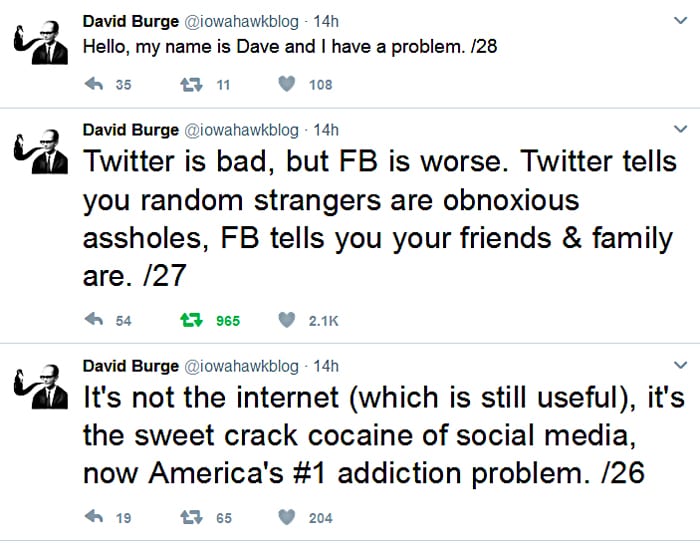WHY YOU HATE SOCIAL MEDIA: Let’s start with Jim Geraghty of NRO on the horrors of Twitter:
Christopher Cooper – a.k.a. “Coop” – is an artist with some libertarian sensibilities known for skateboards, concert posters, album covers. He noted Monday night that he’s thinking of leaving Twitter. His thoughts, cleaned-up for a family newsletter:
Had lunch today with a friend (with way more twitter followers that me) and we both agreed we’re just about ready to shutter our accounts. Neither of us needs the promotion badly enough to deal with the constant barrage of ****heads. If you tweet about politics, you get trolled by ****s, and if you deliberately do not tweet about politics, you get attacked by “woke” ****s. I’ve also seen too many of my friends on here get threats against their families from ****heads & I don’t want to go down that road.
Whatever Twitter once was – I initially used it to stay in touch with far-off friends – it’s now a way to reach a mass audience. Almost anyone can interact with almost anyone. The bad news is, this gives almost anyone in the world an ability to send you messages, and to do so anonymously. No inventor ever likes to contemplate the worst possible application of their new creation; surely Jack Dorsey didn’t think in 2006, “Hey, I’ve just found an amazing way to empower racists, stalkers, psychos, and the most malevolent voices in society!”
Will Rogers famously said he never met a man he didn’t like. Put him on Twitter today and within a week he would turn into H.L. Mencken. Jean-Paul Sartre was close; Hell is other people on Twitter.
The world is full of people who you would never choose to have a conversation with – not because you aren’t open minded or you’re hypersensitive, but because you have better things to do with your life than to spend time around people who mock, berate, sneer, or just overall hate you. And yet, on Twitter, they’re metaphorically right in front of you. Yes, you can block them with the touch of the button. But very few people like being hated, or being reminded that they are hated. And in 2017 America, whatever your view on politics is, someone hates you for holding that view, and is eager to let you know how much they hate you.
(All of this should be a deep, deep concern to the Twitter company.)
So why is anyone on Twitter? Because there’s positive feedback, and that feels good. It feels like an affirmation. You’re right. People agree with you. People like you. They like your one-line joke, your thought, your snappy headline, your photo of what you’re about to eat. Every once in a while, they react in ways that make you think or reconsider what you thought before.
On Twitter, the ratio of useful/enjoyable interaction to useless/unenjoyable interaction has been steadily sliding in the wrong direction.
And now over to Bethany Mandel of the Federalist on the excesses of Facebook, or as she writes, “Facebook Dead At 12, A Victim Of 2016:”
One of my many friends also feeling this way, Sarah Barak, wrote on Facebook recently: “I feel hectored. I’ll be happier if I unfollow the worst offenders. It’s just too much and the constant negative coverage is affecting my happiness.” It’s not just in our imaginations; there’s plenty of social science research that indicates surrounding oneself with Negative Nancies has a way of turning you into a Negative Nancy also. It’s impossible to know for sure, but it seems many who were once politically ambivalent at best are now caught in a negative feedback loop, perpetually hysterical because all of their friends are as well.
The problem with Facebook political rants is this: It is not Twitter. I do not “follow” my high school best friends because of their insightful political commentary; I want to see updates on their lives and pictures of their adorable children. Unlike Twitter, I don’t want to unfollow or unfriend them because of their rants, because if I do so, I’ll miss out on the all-important baby announcements and updates.
If all you’re using Facebook for is to yell into the digital void about politics, you will find your audience for such rants is getting smaller by the minute. Sorry, random friends from all walks of life: I just don’t care what you think about Donald Trump today.
I hoped the tone would improve post-election, but with the inauguration and every statement or story out of the Trump administration, the hysteria remains at a fevered pitch. And I’m sick of it.
My solution, and that of many friends, has been significant or total disengagement from the social network, shifting usage to Instagram instead to catch most of those important baby and kid pictures.
This past weekend, a self-described Princeton neuroscientist, whose amygdala was suddenly hijacked by all things Trump, decided to take out his concerns over our new president by doing what any serious academic would do at that moment: he addressed his anger towards Dave Burge, aka Iowahawk, who was busy, as is his wont, tweeting photos of hot rod cars. “Glad to see brave conservatives face up to a Constitutional crisis with…Sunday car talk,” our brave Princeton neuroscientist speaking truth to gearhead tweeted to the Bard of Des Moines.
In response, Burge tweeted (among other things), “let me break it down for you, ‘neuroscientist’: I’m not a conservative, and not a public utility to argue on topics you choose.” Eventually, he followed up with a series of 36 Tweets on why he’s burning out on Twitter. I was hoping a site like Twitchy or Storify would link them together in one place, but I haven’t found it yet. But If you’re reading this post on the day it went up, go to Iowahawk’s Twitter homepage and keep scrolling, and you’ll come across it eventually. Exit quotes:

